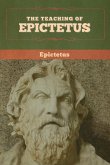Teaching Philosophy
Theoretical Reflections and Practical Suggestions
Herausgeber: Kasachkoff, Tziporah
Teaching Philosophy
Theoretical Reflections and Practical Suggestions
Herausgeber: Kasachkoff, Tziporah
- Broschiertes Buch
- Merkliste
- Auf die Merkliste
- Bewerten Bewerten
- Teilen
- Produkt teilen
- Produkterinnerung
- Produkterinnerung
Here, two dozen distinguished philosophers share their insights and practical suggestions on a diverse range of pedagogic issues with essays on how to motivate students, constructing syllabi for particular courses, teaching particularly complex concepts, and constructing creative examinations.
Andere Kunden interessierten sich auch für
![Teaching Mysteries Teaching Mysteries]() Clifford MayesTeaching Mysteries61,99 €
Clifford MayesTeaching Mysteries61,99 €![The Craft of University Teaching The Craft of University Teaching]() Peter LindsayThe Craft of University Teaching39,99 €
Peter LindsayThe Craft of University Teaching39,99 €![Professionalism and Ethics in Teaching Professionalism and Ethics in Teaching]() David CarrProfessionalism and Ethics in Teaching84,99 €
David CarrProfessionalism and Ethics in Teaching84,99 €![Gender, Teaching and Research in Higher Education Gender, Teaching and Research in Higher Education]() Gillian HowieGender, Teaching and Research in Higher Education63,99 €
Gillian HowieGender, Teaching and Research in Higher Education63,99 €![Teaching the Child Patriotism Teaching the Child Patriotism]() Kate Upson ClarkeTeaching the Child Patriotism25,99 €
Kate Upson ClarkeTeaching the Child Patriotism25,99 €![The Teaching of Epictetus The Teaching of Epictetus]() EpictetusThe Teaching of Epictetus18,99 €
EpictetusThe Teaching of Epictetus18,99 €![Teaching My Art My Heart Teaching My Art My Heart]() Ike WilliamsTeaching My Art My Heart18,99 €
Ike WilliamsTeaching My Art My Heart18,99 €-
-
-
Here, two dozen distinguished philosophers share their insights and practical suggestions on a diverse range of pedagogic issues with essays on how to motivate students, constructing syllabi for particular courses, teaching particularly complex concepts, and constructing creative examinations.
Hinweis: Dieser Artikel kann nur an eine deutsche Lieferadresse ausgeliefert werden.
Hinweis: Dieser Artikel kann nur an eine deutsche Lieferadresse ausgeliefert werden.
Produktdetails
- Produktdetails
- Verlag: Globe Pequot Publishing Group Inc/Bloomsbury
- Seitenzahl: 302
- Erscheinungstermin: 24. März 2004
- Englisch
- Abmessung: 229mm x 152mm x 18mm
- Gewicht: 493g
- ISBN-13: 9780742514492
- ISBN-10: 0742514498
- Artikelnr.: 21756153
- Herstellerkennzeichnung
- Produktsicherheitsverantwortliche/r
- Europaallee 1
- 36244 Bad Hersfeld
- gpsr@libri.de
- Verlag: Globe Pequot Publishing Group Inc/Bloomsbury
- Seitenzahl: 302
- Erscheinungstermin: 24. März 2004
- Englisch
- Abmessung: 229mm x 152mm x 18mm
- Gewicht: 493g
- ISBN-13: 9780742514492
- ISBN-10: 0742514498
- Artikelnr.: 21756153
- Herstellerkennzeichnung
- Produktsicherheitsverantwortliche/r
- Europaallee 1
- 36244 Bad Hersfeld
- gpsr@libri.de
Edited by Tziporah Kasachkoff - Contributions by Jonathan E. Adler; Martin Benjamin; James P. Cadello; Steven M. Cahn; Joan C. Callahan; Jo A. Chern; Stephen H. Daniel; Juli Eflin; Carrie Figdor; Newton Garver; Theodore A. Gracyk; Lawrence H. Hinman; Euge
Part 1 I Introducing Students to Philosophy Chapter 2 Teaching Introductory
Philosophy Chapter 3 Introducing Philosophy Chapter 4 Teaching Introductory
Philosophy: A Restricted Topical Approach Part 5 II Helping Our Students
Improve Chapter 6 How to Improve Your Teaching Chapter 7 Reading and
Interpretation: A Heuristic for Improving Students' Comprehension of
Philosophy Texts Chapter 8 Improving Student Papers in 'Introduction to
Philosophy' Courses Chapter 9 Using Essay Exams to Teach and Not Merely to
Assess Part 10 III Teaching Applied Ethics Chapter 11 From the "Applied" to
the Practical: Teaching Ethics for Use Chapter 12 A Social Dilemma Game for
an Ethics Class Part 13 IV Teaching Philosophy with Computers Chapter 14
Teaching With a Screen Part 15 V Teaching Aesthetics Chapter 16 The Case
Method Approach to the Teaching of Aesthetics Part 17 VI Teaching
Philosophy of Religion Chapter 18 Teaching Philosophy of Religion (either
as a full course or as part of an 'Introduction to Philosophy') Chapter 19
Three Courses in Philosophy of Religion Part 20 VII Teaching Critical
Thinking Chapter 21 Using Pseudoscience in a Critical Thinking Class
Chapter 22 A Critical Thinking Portfolio Part 23 VIII Teaching Philosophy
Through History Chapter 24 The Teaching of Philosophy-Historically Part 25
IX Teaching Kant/Teaching Hegel Chapter 26 A User-Friendly Copernican
Revolution Chapter 27 Charting Kant Chapter 28 On Teaching Hegel: Problems
and Possibilities Chapter 29 Hegel and Family Values Part 30 X Teaching
Existentialism/Teaching Continental Philosophy Chapter 31 Teaching
Existentialism Chapter 32 Teaching Recent Continental Philosophy Part 33 XI
Teaching Philosophical Explanation Chapter 34 Teaching 'Inference to the
Best Philosophical Explanation' Part 35 XII Teaching Philosophy of Gender
Chapter 36 Teaching Gender Issues-Philosophically Part 37 XIII Looking at
What We Do in the Classroom Chapter 38 Uncovering the "Hidden Curriculum":
A Laboratory Course in Philosophy of Education Chapter 39 A Graduate
Seminar on Teaching Philosophy Part 40 About the Contributors Part 41 About
the Editor
Philosophy Chapter 3 Introducing Philosophy Chapter 4 Teaching Introductory
Philosophy: A Restricted Topical Approach Part 5 II Helping Our Students
Improve Chapter 6 How to Improve Your Teaching Chapter 7 Reading and
Interpretation: A Heuristic for Improving Students' Comprehension of
Philosophy Texts Chapter 8 Improving Student Papers in 'Introduction to
Philosophy' Courses Chapter 9 Using Essay Exams to Teach and Not Merely to
Assess Part 10 III Teaching Applied Ethics Chapter 11 From the "Applied" to
the Practical: Teaching Ethics for Use Chapter 12 A Social Dilemma Game for
an Ethics Class Part 13 IV Teaching Philosophy with Computers Chapter 14
Teaching With a Screen Part 15 V Teaching Aesthetics Chapter 16 The Case
Method Approach to the Teaching of Aesthetics Part 17 VI Teaching
Philosophy of Religion Chapter 18 Teaching Philosophy of Religion (either
as a full course or as part of an 'Introduction to Philosophy') Chapter 19
Three Courses in Philosophy of Religion Part 20 VII Teaching Critical
Thinking Chapter 21 Using Pseudoscience in a Critical Thinking Class
Chapter 22 A Critical Thinking Portfolio Part 23 VIII Teaching Philosophy
Through History Chapter 24 The Teaching of Philosophy-Historically Part 25
IX Teaching Kant/Teaching Hegel Chapter 26 A User-Friendly Copernican
Revolution Chapter 27 Charting Kant Chapter 28 On Teaching Hegel: Problems
and Possibilities Chapter 29 Hegel and Family Values Part 30 X Teaching
Existentialism/Teaching Continental Philosophy Chapter 31 Teaching
Existentialism Chapter 32 Teaching Recent Continental Philosophy Part 33 XI
Teaching Philosophical Explanation Chapter 34 Teaching 'Inference to the
Best Philosophical Explanation' Part 35 XII Teaching Philosophy of Gender
Chapter 36 Teaching Gender Issues-Philosophically Part 37 XIII Looking at
What We Do in the Classroom Chapter 38 Uncovering the "Hidden Curriculum":
A Laboratory Course in Philosophy of Education Chapter 39 A Graduate
Seminar on Teaching Philosophy Part 40 About the Contributors Part 41 About
the Editor
Part 1 I Introducing Students to Philosophy Chapter 2 Teaching Introductory
Philosophy Chapter 3 Introducing Philosophy Chapter 4 Teaching Introductory
Philosophy: A Restricted Topical Approach Part 5 II Helping Our Students
Improve Chapter 6 How to Improve Your Teaching Chapter 7 Reading and
Interpretation: A Heuristic for Improving Students' Comprehension of
Philosophy Texts Chapter 8 Improving Student Papers in 'Introduction to
Philosophy' Courses Chapter 9 Using Essay Exams to Teach and Not Merely to
Assess Part 10 III Teaching Applied Ethics Chapter 11 From the "Applied" to
the Practical: Teaching Ethics for Use Chapter 12 A Social Dilemma Game for
an Ethics Class Part 13 IV Teaching Philosophy with Computers Chapter 14
Teaching With a Screen Part 15 V Teaching Aesthetics Chapter 16 The Case
Method Approach to the Teaching of Aesthetics Part 17 VI Teaching
Philosophy of Religion Chapter 18 Teaching Philosophy of Religion (either
as a full course or as part of an 'Introduction to Philosophy') Chapter 19
Three Courses in Philosophy of Religion Part 20 VII Teaching Critical
Thinking Chapter 21 Using Pseudoscience in a Critical Thinking Class
Chapter 22 A Critical Thinking Portfolio Part 23 VIII Teaching Philosophy
Through History Chapter 24 The Teaching of Philosophy-Historically Part 25
IX Teaching Kant/Teaching Hegel Chapter 26 A User-Friendly Copernican
Revolution Chapter 27 Charting Kant Chapter 28 On Teaching Hegel: Problems
and Possibilities Chapter 29 Hegel and Family Values Part 30 X Teaching
Existentialism/Teaching Continental Philosophy Chapter 31 Teaching
Existentialism Chapter 32 Teaching Recent Continental Philosophy Part 33 XI
Teaching Philosophical Explanation Chapter 34 Teaching 'Inference to the
Best Philosophical Explanation' Part 35 XII Teaching Philosophy of Gender
Chapter 36 Teaching Gender Issues-Philosophically Part 37 XIII Looking at
What We Do in the Classroom Chapter 38 Uncovering the "Hidden Curriculum":
A Laboratory Course in Philosophy of Education Chapter 39 A Graduate
Seminar on Teaching Philosophy Part 40 About the Contributors Part 41 About
the Editor
Philosophy Chapter 3 Introducing Philosophy Chapter 4 Teaching Introductory
Philosophy: A Restricted Topical Approach Part 5 II Helping Our Students
Improve Chapter 6 How to Improve Your Teaching Chapter 7 Reading and
Interpretation: A Heuristic for Improving Students' Comprehension of
Philosophy Texts Chapter 8 Improving Student Papers in 'Introduction to
Philosophy' Courses Chapter 9 Using Essay Exams to Teach and Not Merely to
Assess Part 10 III Teaching Applied Ethics Chapter 11 From the "Applied" to
the Practical: Teaching Ethics for Use Chapter 12 A Social Dilemma Game for
an Ethics Class Part 13 IV Teaching Philosophy with Computers Chapter 14
Teaching With a Screen Part 15 V Teaching Aesthetics Chapter 16 The Case
Method Approach to the Teaching of Aesthetics Part 17 VI Teaching
Philosophy of Religion Chapter 18 Teaching Philosophy of Religion (either
as a full course or as part of an 'Introduction to Philosophy') Chapter 19
Three Courses in Philosophy of Religion Part 20 VII Teaching Critical
Thinking Chapter 21 Using Pseudoscience in a Critical Thinking Class
Chapter 22 A Critical Thinking Portfolio Part 23 VIII Teaching Philosophy
Through History Chapter 24 The Teaching of Philosophy-Historically Part 25
IX Teaching Kant/Teaching Hegel Chapter 26 A User-Friendly Copernican
Revolution Chapter 27 Charting Kant Chapter 28 On Teaching Hegel: Problems
and Possibilities Chapter 29 Hegel and Family Values Part 30 X Teaching
Existentialism/Teaching Continental Philosophy Chapter 31 Teaching
Existentialism Chapter 32 Teaching Recent Continental Philosophy Part 33 XI
Teaching Philosophical Explanation Chapter 34 Teaching 'Inference to the
Best Philosophical Explanation' Part 35 XII Teaching Philosophy of Gender
Chapter 36 Teaching Gender Issues-Philosophically Part 37 XIII Looking at
What We Do in the Classroom Chapter 38 Uncovering the "Hidden Curriculum":
A Laboratory Course in Philosophy of Education Chapter 39 A Graduate
Seminar on Teaching Philosophy Part 40 About the Contributors Part 41 About
the Editor








